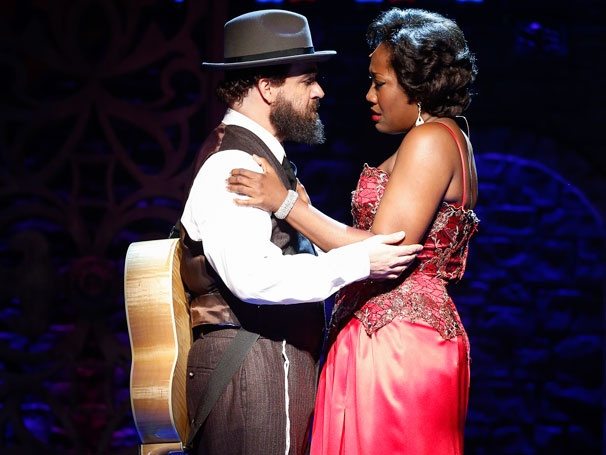

“Soul Doctor,” the new musical about the life and music of Rabbi Shlomo Carlebach, had a bumpy ride to Broadway, including poor pre-Broadway reviews on the road and promising but not quite “money” notices when the show played off-Broadway. But the producers listened and shored up what was working: lead actor Eric Anderson, the story of Carlebach’s unexpected friendship with troubled chanteuse Nina Simone, and the spirited spiritual music. The results opened Thursday, Aug. 15, at Circle in the Square Theater.
Did the critics have their souls rocked, or does the show still need a doctor? Let’s see:
Barbara and Scott Siegel, the married team of TheaterMania critics, were definitely won over, calling the show “engaging and often moving.” They add, “The show's power, however, ultimately comes from the music, which was written by Carlebach, with thrilling orchestrations by Steve Margoshes.” The Siegels also praised the singing and singled out Merideth Kaye Clark for her “star turn.”
Daily News scribe Joe Dziemianowicz was less impressed, calling the show “affectionate but superficial.” His two-star review also notes the book’s “by-the-numbers” quality and that supporting characters are “sketchy to the point of trivialization.”
“Soul Doctor” mustered only two stars from USA Today’s Elysa Gardner, as well. “Alas,” she writes, “the musical's mix of hokey humor and preachy sentimentality is bound to test the most altruistic spirit… Surely, there are more entertaining, less trying ways to promote universal harmony.”
Even harder on the book was AM New York’s Matt Windman, who praised the show’s “openhearted” spirit but said that “Soul Doctor” needs “a show doctor” to salvage a “sanitized, overstuffed mix of `The Jazz Singer,’ `Fiddler on the Roof’ and `Hair.’”
The New York Times was not converted, either. “Soul Doctor,” writes Charles Isherwood, “lays out Carlebach’s journey in mostly blunt, often hoary strokes.” He calls the musical “bizarre and bewildering” with a book “rather thick with shtick.” On the plus side, Carlebach’s music “is often beautiful,” and Isherwood praises lead actor Anderson’s “soft, captivating intensity.” Still, when a musical’s protagonist is “a bland, bromide-spouting relic of the hippie era, albeit one tie-dyed in classic Jewish guilt,” that’s not exactly a money review.
Variety scribe Marilyn Stasio couldn’t see the musical having appeal beyond its “niche” audience: “Unless you're personally into it,” she writes, “there's entirely too much of this ponderous religious pedantry to keep an audience alert. And while the cast seems to be in constant motion, the choreography is clunky and obvious.” By the time Amber Iman (as Nina Simone) “comes to the rescue, it’s just too late.”
Though he mildly criticizes Daniel Wise’s “sprawling book” (at least until the show’s finale, which struck him as phony wishful thinking), Newsday’s Steve Parks proved fairly positive about the show, praising some of its “riveting moments” and the charismatic Carlebach (by way of Anderson) “raising a musical ruckus.”
Moving to the outer boroughs, Michael J. Fressola of Staten Island Live found the show a mild disappointment with “affected and robotic” choreography, though he, too, liked Iman’s Simone.
Calling “Soul Doctor” an “unctuous, amiably shambling biomusical,” Vulture.com’s Scott Brown complains that for all the biographical information in the show, Carlebach remains a cipher. (He also notes the show’s most bothersome omission: “You’ll hear no mention of the posthumous sexual harassment charges lodged against Rabbi Shlomo. Drugs, sex, women: it’s all paved over with warm kugel.”) Brown also makes the point that since Carlebach’s songs weren’t designed for Broadway, they’re pleasant but stubbornly resist creating any kind of musical drama.
Hollywood Reporter critic Frank Scheck slammed “Soul Doctor’s” “choppily episodic storyline” and “groan-inducing dialogue,” though he did find the “joyous energy” of the tunes “undeniably infectious.” He also lauded the lead performers and, like several other reviewers, Scheck wished the “beautifully written and performed” scene between Carlebach and Simone was a bigger part of the musical.
The Jewish Daily Forward’s Ezra Glinter – who, to his credit, writes in depth about the allegations of sexual misconduct that have “tarnished” Carlebach’s posthumous reputation – admits to mixed feelings about other aspects of the show. He calls it “overly long” and questions whether the “rebellious” side of Carlebach (talking to women, adding music to synagogue servies) is too culturally insular to create strong enough conflict for a mass-market musical. “The drama of Carlebach’s life,” writes Glinter, “was about inter-Jewish controversy, not a departure from Judaism à la `The Jazz Singer.’” Glinter did find the first-act finale, in which Carlebach finds his voice in a recording studio by stripping away “the slick studio-band accompaniment” to create “an ecstatic song” with a “euphoric effect,” rousing and inspired.
What will all these mostly negative reviews mean for the show’s chances on Broadway? In his Friday New York Post column, Michael Riedel gives it a week before the producers “are sitting shiva.” Personally, I’d wager the show will have enough of a core audience to struggle through the Jewish high holy days – but good luck stretching that through Simchas Torah by late September.